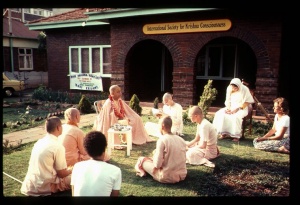SB 4.20.9

A.C. Bhaktivedanta Swami Prabhupada
TEXT 9
- yaḥ sva-dharmeṇa māṁ nityaṁ
- nirāśīḥ śraddhayānvitaḥ
- bhajate śanakais tasya
- mano rājan prasīdati
SYNONYMS
yaḥ — anyone who; sva-dharmeṇa — by his occupational duties; mām — Me; nityam — regularly; nirāśīḥ — without any motive; śraddhayā — with faith and devotion; anvitaḥ — endowed; bhajate — worships; śanakaiḥ — gradually; tasya — his; manaḥ — mind; rājan — O King Pṛthu; prasīdati — becomes fully satisfied.
TRANSLATION
The Supreme Personality of Godhead, Lord Viṣṇu, continued: My dear King Pṛthu, when one situated in his occupational duty engages in My loving service without motive for material gain, he gradually becomes very satisfied within.
PURPORT
This verse is also confirmed by the Viṣṇu Purāṇa. Occupational duties are known as varṇāśrama-dharma and apply to the four divisions of material and spiritual life—namely brāhmaṇa, kṣatriya, vaiśya and śūdra, and brahmacarya, gṛhastha, vānaprastha and sannyāsa. If one works according to the varṇāśrama-dharma system and does not desire fruitive results, he gets satisfaction gradually. Discharging one's occupational duty as a means of rendering devotional service unto the Supreme Personality of Godhead is the ultimate goal of life. Bhagavad-gītā confirms this as the process of karma-yoga. In other words, we should act only for the satisfaction and service of the Lord. Otherwise we will be entangled by the resultant actions.
Everyone is situated in his occupational duty, but the purpose of material occupations should not be material gain. Rather, everyone should offer the results of his occupational activities. A brāhmaṇa especially should execute his occupational duties not for material gain but to please the Supreme Personality of Godhead. The kṣatriya, vaiśya and śūdra should work in a similar way. In this material world everyone is engaged in various professional and occupational duties, but the purpose of such activities should be to please the Supreme Personality of Godhead. Devotional service is very simple, and anyone can adopt it. Let one remain what he is; he need only install the Deity of the Supreme Lord in his house. The Deity may be Rādhā-Kṛṣṇa or Lakṣmī-Nārāyaṇa (there are many other forms of the Lord). In this way a brāhmaṇa, kṣatriya, vaiśya or śūdra can worship the Deity with the results of his honest labor. Regardless of one's occupational duty, one should adopt the devotional means of hearing, chanting, remembering, worshiping, offering everything to the Lord and engaging in His service. In this way one can very easily engage himself in the service of the Lord. When the Lord is pleased with one's service, one's mission in life is fulfilled.